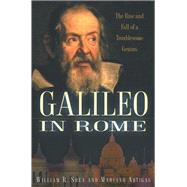
Galileo in Rome
by William R. Shea; Mariano ArtigasRent Textbook
Rent Digital
New Textbook
We're Sorry
Sold Out
Used Textbook
We're Sorry
Sold Out
Summary
The book offers a fascinating account of the six trips Galileo made to Rome, from his first visit at age 23, as an unemployed mathematician, to his final fateful journey to face the Inquisition. The authors reveal why the theory that the Earth revolves around the Sun, set forth in Galileo's Dialogue, stirred a hornet's nest of theological issues, and they argue that, despite these issues, the Church might have accepted Copernicus if there had been solid proof. More interesting, they show how Galileo dug his own grave. To get the imprimatur, he brought political pressure to bear on the Roman Censor. He disobeyed a Church order not to teach the heliocentric theory. And he had a character named Simplicio (which in Italian sounds like simpleton) raise the same objections to heliocentrism that the Pope had raised with Galileo. The authors show that throughout the trial, until the final sentence and abjuration, the Church treated Galileo with great deference, and once he was declared guilty commuted his sentence to house arrest.
Here then is a unique look at the life of Galileo as well as a strikingly different view of an event that has come to epitomize the Church's supposed antagonism toward science.
Author Biography
William R. Shea holds the "Galileo Chair" of the History of Science at the University of Padua, in Italy. He is Past President of both the International Union of the History and Philosophy of Science and the International Academy of the History of Science, and is currently Chairman of the Standing Committee for the Humanities of the European Science Foundation in Strasbourg. He is the author, co-author, or editor of 25 books, including Galileo's Intellectual Revolution and The Magic of Numbers and Motion: The Scientific Career of Rene Descartes.
Mariano Artigas is Professor of Philosophy of Science and was Dean of the Ecclesiastical Faculty of Philosophy at the University of Navarra, in Pamplona, Spain. He holds a Ph.D. both in physics and philosophy, is an ordained Catholic priest, and has written 14 books, including The Mind of the Universe, which won a Templeton Award.
An electronic version of this book is available through VitalSource.
This book is viewable on PC, Mac, iPhone, iPad, iPod Touch, and most smartphones.
By purchasing, you will be able to view this book online, as well as download it, for the chosen number of days.
Digital License
You are licensing a digital product for a set duration. Durations are set forth in the product description, with "Lifetime" typically meaning five (5) years of online access and permanent download to a supported device. All licenses are non-transferable.
More details can be found here.
A downloadable version of this book is available through the eCampus Reader or compatible Adobe readers.
Applications are available on iOS, Android, PC, Mac, and Windows Mobile platforms.
Please view the compatibility matrix prior to purchase.
